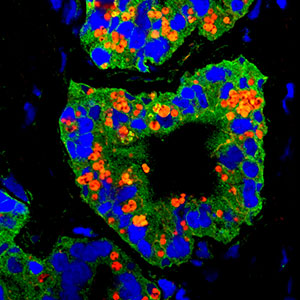Prostate Cancer Symptoms
During the early stages of prostate cancer, there are no symptoms. That’s why screenings and yearly check-ups are critically important in catching cancer early, before it spreads outside the prostate. In other words, you may not have any symptoms at all and cancer may be detected as a result of a general health check-up where a PSA test and physical exam of the prostate is given.
Most prostate cancer is found as a result of prostate cancer screening tests, most commonly a Prostate Specific Antigen (PSA) test and a Digital Rectal Exam (DRE).
Many prostate cancer symptoms are very similar to benign prostatic hyperplasia (BHP), prostatitis, erectile dysfunction, or overactive bladder.
These include:
- Strong urge to urinate immediately
- Frequent nighttime urination
- Pain and/or burning when urinating
- Difficulty starting the urinary stream
- A weak urinary stream once it starts
- Dribbling after you’re finished
- Pain in the genital and pelvic area
- Pain when ejaculating
- Blood in the urine or semen
- Frequent urinary tract infections
Other more serious prostate cancer symptoms may include:
- Unexpected weight loss
- Pain in the lower back or pelvic area
- Anemia
- Fatigue
Before deciding on treatment, here are some questions you may want to ask yourself:
- Are you the type of person who needs to do something about your cancer, even if it might result in serious side effects? Or would you be comfortable with watchful waiting/active surveillance, even if it means you might have more anxiety (and need more frequent follow-up) in the future?
- Do you need to know right away whether your doctor thinks he or she was able to get all of the cancer out (a reason some men choose surgery)? Or are you comfortable with not knowing the results of treatment for a while (as is the case in radiation therapy) if it means not having to have surgery?
- Do you prefer to go with the newest technology (such as robotic surgery or proton beam radiation therapy), which might have some theoretical advantages? Or do you prefer to go with treatment methods that are better proven and with which doctors might have more experience?
- Which potential treatment side effects (incontinence, impotence, bowel problems) might be most distressing to you? (Some treatments are more likely to cause certain side effects than others.)
- How important for you are issues like the amount of time spent in treatment or recovery?
- If your initial treatment is not successful, what would your options be at that point?
Many men find it very stressful to have to choose between treatment options, and are very fearful they will choose the “wrong” one. In many cases, there is no single best option, so it’s important to take your time and decide which option is right for you.

